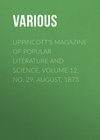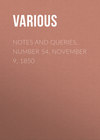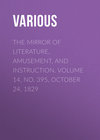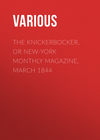Loe raamatut: «Lippincott's Magazine of Popular Literature and Science, Volume 12, No. 29, August, 1873», lehekülg 2
The horse thus vicariously fulfilling the functions of a plate of soup was a wretched glandered beast—not old, but shunned on account of the contagious nature of his disease. Having received the order to take him to be killed at the abattoir, monsieur the valet, having better things to do, gave the commission to Joliet, with all its perquisites.
Joliet did not kill the steed: he cured it. He tended it, he drenched it, he saved it. By what remedy? I cannot tell. I have never been a farrier, though Joliet himself made me perforce a poulterer. Many a bit of knowledge is picked up by those who travel the great roads. The sharp Bohemian, by playing at all trades, brushing against gentry of all sorts and scouring all neighborhoods, becomes at length a living cyclopaedia.
Joliet, like Democritus and Plato, saw everything with his own eyes, learned everything at first hand. He was a keen observer, and in our interviews subsequent to the affair of the chickens I was more than once surprised by the extent of his information and the subtlety of his insight. His wits were tacked on to a number of remote supports. In our day, when each science has become so complicated, so obese, that a man's lifetime may be spent in exercising round one of them, there are hardly any generalizers or observers fit to estimate their relativity, except among the two classes called by the world idlers and ignorants—the poets and the Bohemians.
Joliet, now having joined the ranks of the cavalry, found his account in his new dignity. He became an orderly, a messenger. He carried parcels, he transported straw and hay. If the burden was too heavy for the poor convalescent, the man took his own portion with a good grace, and the two mutually aided each other on the errand. Thanks to his horse, the void left by his failure to learn a trade was filled up by a daily and regular task: what was better, an affection had crept into his heart. He loved his charge, and his charge loved him.
This great hotel, the world, seemed to be promising entertainment then for both man and beast, when an epoch of disaster came along—a season of cholera. In the villages where Joliet's business lay the doors just beginning to be hospitable were promptly shut against him. Where the good townsmen had recognized Assistance in his person, they now saw Contagion.
If he had been a single man, he could have lain back and waited for better times. But he now had two mouths to feed. He kissed his horse and took a resolution.
He had never been a mendicant. "Beggars don't go as hungry as I have gone," said he. "But what will you have? Nobility obliges. My father was a gentleman. I have broken stones, but never the devoirs of my order."
He left the groups of villages among which his new industry had lain. The cholera was behind him: trouble, beggary perhaps, was before him. As night was coming on, Joliet, listlessly leading his horse, which he was too considerate to ride, saw upon the road a woman whom he took in the obscurity for a farmer's wife of the better class or a decent villager. For an introduction the opportunity was favorable enough. On her side, the quasi farmer's wife, seeing in the dusk an honest fellow dragging a horse, took him for a "gentleman's gentleman" at the least, and the two accosted each other with that easy facility of which the French people have the secret. Each presented the other with a hand and a frank smile.
Joliet, whom I have erred perhaps in comparing to Democritus, was nevertheless a laugher and a philosopher. But his grand ha-ha! usually infectious, was not shared on this occasion. The wanderer could not show much merriment. A sewing-woman with a capacity for embroidery, her needle had given her support, but now a sudden warning of paralysis, and symptoms of cholera added to that, had driven her almost to despair. She was without home, friend or profession.
Joliet set her incontinently on horseback, and walked by her side to a good village curé's two miles off—the same who had assisted him to his first communion, and for whom he subsequently became a beadle. The kind priest opened his arms to the man, his heart to the woman, his stable to the horse. For his second patient my Bohemian set in motion all his stock of curative ideas. In a month she was well, and the curé no longer had three pensioners, for of two of them he made one.
Two poverties added may make a competence. Monsieur and Madame Joliet were good and willing. The man began to wear a strange not unbecoming air of solidity and good morals. The girls now saluted him respectfully when he passed through a village.
One thing, however, in the midst of his proud honeymoon perplexed him much. Hardly married, and over head and ears in love, he knew not how to invite his bride to some wretched garret, himself deserting her to resume his former life in the open air. To give up the latter seemed like losing existence itself.
One morning, as he asked himself the difficult question, a pair of old wheels at the door of a cartwright seemed of their own accord to resolve his perplexity. He bought them, the payment to be made in labor: for a week he blew the wheelwright's bellows. The wheels were his own: to make a wagon was now the affair of a few old boards and a gypsy's inventiveness.
Thus was conceived that famous establishment where, for several years, lived the independent monarch and his spouse, rolling over the roads, circulating through the whole belt of villages around Paris, and carrying in their ambulant home, like the Cossacks, their utensils, their bed, their oven, their all.
From town to town they carried packages, boxes and articles of barter. At dinner-time the van was rolled under a tree. The lady of the house kindled a fire in the portable stove behind a hedge or in a ditch. The hen-coop was opened, and the sage seraglio with their sultan prudently pecked about for food. At the first appeal they re-entered their cage.
At the same appeal came flying up the dog of the establishment, a most piteous-looking griffin, disheveled, moulted, staring out of one eye, lame and wild. For devotion and good sense his match could be found nowhere. Like his horse, his wife, his house and the pins in his sleeve, Joliet had picked the collie up on the road.
The arrival of a tiny visitor to the Bohemian's address made a change necessary. Little Francine's dowry was provided by my humorous acquisition of the yellow and slate-colored chickens.
With his savings and my banknote Joliet determined to have a fixed residence. He succeeded of course. The walls, the windows, the doors, everything but the garden-patch, he picked up along the roads.
Buried in eglantine and honeysuckle, soon no one would suspect the home-made character of Joliet's château. It became the centre of my botanizing excursions. Francine grew into a fair, slim girl, like the sweetest and most innocent of Gavarni's sketches, and sold flowers to the passers-by.
Such were the souvenirs I had of this brave tavern-keeper in his old capacity of roadster and tramp. Now, after an hiatus of years, I found him before me in a different character at the beginning of my roundabout trips to Marly.
But what had become of my favorite little rose-merchant?
"Francine?" asked Joliet briskly, as if he was wondering whom I could mean by such a name. "You mean my wife? Poor thing! She is dead."
"I am speaking of your daughter, Father Joliet."
"Oh, my daughter, my girl Francine? She went to live with her godmother. It was ten years ago."
"And you have not seen her since?"
"Yes—yes—two years back. She has gone again."
"To her godmother?"
"No."
"Why so?"
"Her godmother would not receive her. Don't wring my heart so, sir!"
EDWARD STRAHAN.
[TO BE CONTINUED.]
OUR HOME IN THE TYROL
CHAPTER VII
We left the Hof one August Friday—we were not superstitious—a goodly company, sufficient to freight the rumbling old stage-wagon which jolted daily between Bruneck and Taufers, a distance of nine miles. At this village the sedater portion of the party were to settle down with books, pencils and drawing-paper until the Alpine visit should have been paid.
The valley of Taufers, running northward with a grand vista to the north-west of the vast Zillerthal snow-fields, suggests at a distance the idea of a stern, joyless district. When in the broader Pusterthal the sunshine floods upland plain and slope, this important but narrow tributary valley lies steeped in its gloomy shade, the dark sides of the Sambock frowning grimly on the opposite shadowy Tesselberg. Great, therefore, was the surprise of some of the party to find, as we drove along, instead of melancholy solitude, prosperous villages basking in sunshine, whilst little children skipped merrily, and men and women worked amongst the golden stooks as if enjoying the labor of their hands. Yes, strange to say, effulgent sunshine everywhere on acre and meadow, and slanting down upon a wayside cottage garden, where a freshly-painted Christ lay drying between tall sunflowers. This cottage seemed the only shadow in this unexpectedly bright picture, for, occupied by a religious image-maker, crucifixes and wooden saints peeped wholesale out of the windows. Is it a want of sensibility in these poor Tyrolese peasants which causes them to cling tenaciously to such frightful material forms of religion, making them give prominence to every conceivable sign of sacred sorrow and suffering? But the jolting stage-wagon allowed us no time to analyze this painful, ever-recurring feature of the Tyrol. When we next looked up we saw above us, on a wooded crag, a square gray tower, which, once a stronghold, appears, as if exhausted with old age, to be tottering into the midst of lesser ruins.
It was Neuhaus, once a fortress of the rigid old barons of Tuvers. Hugo, the sixth lord, died there in 1309, and in the chapel, which still stands, mass is said at stated periods for the salvation of his soul and the souls of his relations. The whole place would undoubtedly have been given over to the owls and the bats had not two adjacent springs—one of iron, the other of chalk and alum—been considered, a quarter of a century since, either as preventives or as cures for the cholera, then raging. A chalet was therefore planted on the rocks between the chapel and the castle, and a bath-house opened, which would probably be still much frequented on account of the beauty of the situation were the bath-owner only a little more attentive to the comfort of his humble guests.
The valley, apparently so gloomy, proved not only cheerful, but full of romance and old-world memories. Other castles there were, perched gracefully on their crags; and thus, much sooner than we had anticipated, we found ourselves stopping at the Post in Taufers. Rather Sand in Taufers, the single appellation being used chiefly for the parent church, which, with a mortuary chapel and a house for the "young and sick," stands apart. Sand and Moritz, two prosperous villages, cluster with this group of buildings at the head of the valley, gathering like fiefs at the foot of the fine old castle, still one of the grandest feudal remains in ruin-bestrewn Tyrol. A third village, Müklen, though quite distinct, lies sufficiently near to deserve being included in the circle.
The Post, in prospect of the increase of custom occasioned by the Pusterthal railway, had enlarged its borders during the past winter. Nor had it been deceived in the speculation, for, although only one up-and-down train in the day crawls along the valley, the news of the comfortable inn in the midst of beautiful scenery had already brought custom enough. Thus all our powers of persuasion were lost upon the handsome sister of the young wirth, a noted beauty of the neighborhood. "Their house was full already. Nine guests, who had never sent word beforehand, were quite out of the question, but the Herrschaft could be accommodated at the Elephant opposite, which was related to the Post."
So, crossing over to the Elephant, the house being entirely empty, we found space and cleanliness, and might have found perfect comfort withal, had not the landlord and landlady proved in a perpetual state of somnolency, their few waking intervals being barely sufficient for the supply of the simplest wants. In spite of these and other unsatisfactory auspices, such as the tea being served in a soup-tureen, the stayers voted to remain at the Elephant in our absence, making up for all inward deficiencies by outdoor enjoyment.
A country clown with an honest face, Ignaz by name, agreed for a trifle to carry our bundles and ample provision of food to the Olm. He made a serious matter of it, however, when he pertinaciously insisted on four in the morning being the hour for starting. The dispute finally ended by the agreement to allow Ignaz to carry our belongings at the hour he chose, seeing that all the village was ready to take an affidavit as to his honesty, and we being allowed the same freedom of choice for ourselves. All having thus been comfortably arranged, we sallied forth for an evening stroll.
A turn in the quiet village street soon revealed the great massive castle on its plateau of rock—shattered towers, broken battlements, oriel and bay windows jutting out here and there, its bulwarks running down the precipice, but not, as formerly, shutting in the narrow gorge leading into the Ahrnthal, a busy, populous valley, closed in its turn by the snow-clad bulk of the Tauern, down which, on the farther side, the noted Kriml waterfall plunges. Remembering, from a visit paid to the castle in the former year, that an easy winding road, shaded by trees and commanding splendid mountain-views, led through the fortifications by the back of the castle to the great gateway, we chose it in preference to the steep, perpendicular path, which, always taken by the natives, led equally to the drawbridge and main entrance. To our extreme regret, however, we soon found our course impeded by the huge trunks of mighty pine trees lying in a perfect pell-mell above and on both sides of us. A glance up the hillside showed scores more of these slain giants. To proceed was almost hopeless, and we were forced to rest upon some timber and mark our future course between piles oozing with turpentine.
Whilst we were engaged in our calculations, an old crone, who had been groping about in the crevices for chips and sticks, stopped, and seeing us thus penned in by tree boles, eyed us with a compassionate look. "Ja, ja!" said she, "with fallen trees all jumbled together it is hard for the Herrschaft to move on; but it's harder for us poor folks, who have seen the trees growing here ever since we were born, to hear day and night the axe going hack, hack, and the trees come thudding down. Sixteen strong Welschers from a distance do the work: they knew well enough a Taufern would have looked long at the sixers (ten-kreuzer pieces) before he would have shorn the mighty forests. Look you!" and she pointed to the sky. "As far as you can see they are felling."
We looked, and sure enough the vast woods that clothed the lofty mountainsides were being ruthlessly cleared away. We suggested that a protest should be made.
"Oh, na, na! The woods are none of ours. The graf de Ferraris too has sold the estate to a gesellschaft from Vienna. They care nothing for the castle, but are hungry for timber. The count lives a long way off, and does not feel it, but it must eat the heart of his aged lady mother to the fibres—she lives in the village—to know that foreigners are sweeping down masses of trees by wholesale—trees that have always kept the poor man's noodles boiling. And where are the planks to come from for our houses, our barns, our stables? And how can the cattle be kept from straying without fences of wood? Then, too, avalanches of snow and of stones will fall, and maybe overwhelm the village. Thanks to the Mother of God! they will drop on my grave, but, Lord Jesus, the children and the children's children!"
Having given us these sad scraps of information, and heaving a big sigh, the poor old soul lifted up her bundle of chips and went fumbling forward over her stumbling-blocks.
Sad and true was the picture which she had drawn. Nor does it, alas! belong exclusively to Taufers, but to the whole Tyrol. In many instances the people are themselves eager for this reckless clearing. They hope thereby to secure more pasturage, the feeding and rearing of cattle being the great idea of wealth to the Tyroler. So they make ready money of their timber, which now in the form of masts floats on the Mediterranean and the Suez Canal. The Venetians, requiring timber, have turned the once beautiful, richly-wooded Dalmatia into a dreary, barren land. In the Tyrol it is not generally foreigners, but the natives, who unhesitatingly sweep away woods, which, causing grass and plants to grow, have enabled human habitations to be erected on spots that would otherwise be but dreary wildernesses, the battle-fields of chilling winds and scorching sunshine. The precious timber, which like refuse they cart into the clumsy yawning craters called stoves, or else sell out of the country for economy so called, might not only supply the land for centuries with a proper amount of fuel, either as wood or charcoal, but bring prosperity to many a sequestered village if turned into tools and kitchen utensils, whilst still leaving thousands of trees for export. "The supply has never failed yet," say the Tyrolese: "why should we replant forests to have to cut them down again, when the ground, too, is good for grass or corn?" So the axe lies ruthlessly at the root of every tree, for a heavy reckoning hereafter to the Tyroler.
With a weighing and balancing over every step which we took worthy of a diplomatist, we finally stood upon the drawbridge of the castle. Here the savage customs of the rude days in which it was built immediately impress the beholder. Traces remain of the ponderous iron portcullis, heavy wooden bars, arrow-holes, and slits in the masonry for the pouring of boiling water or oil upon adverse knight or lordly freebooter. A steep path leads through two great entrance-gates into the large inner court, which is erected upon the virgin rock. A roof of old wooden shingles shelters the well, and ancient rotting timber mingles everywhere with the impervious stone in the massive buildings of the castle, conveying a sense of weakness and decay in the midst of the strongest durability.
Not only was the old castle dismantled, but apparently entirely abandoned this summer evening. We were preparing to return without seeing the interior when a little maiden arrived from the village, who with flushed face and timid mien drew the castle key from under a big stone, stood on tiptoe and turned the heavy lock, and the door creaking on its hinges we were left to wander at our will through old wainscoted rooms in the dreamy twilight. No spirit of modern restoration had ever reached them: they were allowed to remain just as inconvenient, but also just as quaint, as on the day of their erection. There were gloomy recesses enough, but there were likewise graceful carvings, mottoes, rare tracery and wood-work; while, strange to say, in several chambers grotesque wooden birds were suspended from the ceiling like malformed ducks, conveying at first no idea of the Holy Dove which the old lords had desired to symbolize, yet probably in those unquiet days their best conception of this emblem of peace.
The barons not only fought, squabbled and feasted, but prayed too in their fashion; so we came upon the chapel, disfigured by barbaric effigies, tawdry ornamentation and flimsy modern artificial flowers. It is still used for the weekly mass which, as at Neuhaus, is read here for the peace of the turbulent lords of Tuvers. Still, within the memory of man a hermit occupied some narrow chambers adjoining the chapel. He had retired amongst these ruins of transitory greatness to warn his fellow-creatures against carnal passions, prayed for the dead and shrived the living. The old anchorite has passed, we hope, into heavenly repose, but cinders, which may almost be called holy ashes, still lie scattered on his deserted little hearth.
The banqueting-hall, a fine though low room, supported on solid rounded arches, contains innumerable flour-and corn-bins, which, though dating from the Middle Ages, are still in perfect condition. Here knight and baron caroused, here mummers have played and bears have danced, whilst sword and spur clanked upon the rude stone floor. In the ladies' bower above many a minne-singer has struck his lyre. Nay, Oswald von Wolkenstein, a prince amongst troubadours, wearing his golden chain and brilliant orders, has brought tears from many a gentle eye as he sang to his harp his pathetic elegies, the cruelty of Sabina his lady, and his adventures in England, Spain and Persia. He was a noble, courtly knight, conversing in French, Moorish, Catalonian, Castilian, German, Latin, Wendisch, Lombardic and Russian; and his bones lie in the great cloister of Neustift, not half a day's journey from Taufers.
How often, too, has the shrill sound of the bugle called to feats of arms in the court, to hawking and hunting in valley and mountain-forest! How many a crusader against Turk, infidel, Prussian and Hussite has crossed the wooden drawbridge upon his war-horse! Yes, and what an excitement in the noble Catholic household when in the adjoining Ahrnthal the peasants, becoming enamored of Lutheranism, rose in the peasant war of 1525! How darkly, too, must they have painted the fanatical bauer Barthlmä Duregger of St. Peter's in the Ahrnthal, who, after being taken prisoner, escaped near their postern gate to circulate threats of fire and murder throughout the neighborhood, vowing to reduce Bruneck to ashes! Reappearing with a band of twelve poachers and twenty-six laborers, and accompanied by Peter Baszler of Antholz, he robbed and plundered the clergy, stripping the worthy priest Andreas Spaat of all his worldly goods, so that he died in the utmost poverty. Although much blood was shed in their pursuit, this lawless, misguided man and his band were never taken. Great as their sin would naturally seem to the noble family at the castle, no less lamentable and equally worthy of torture and death would the heretics of Bruneck appear. About the same time the sacrilegious books, as they were called, of Zwingli and Luther were sold there openly, conventicle hymns were sung in the streets, and the priest Stephan Gobi preached against the holy doctrine of confession and the invocation of saints; whilst the schoolmaster Bartholomew Huber, though he could not find time to teach the children the catechism, puzzled their innocent minds with Virgil's Georgics and Cicero's Letters. Toward the end of the sixteenth century the heresy was suppressed, when the lords and ladies of Taufers Castle sang no doubt a triumphant Te Deum in their chapel. The inmates were not then barons of Tuvers proper, for the title having early become extinct the castle passed into many noble hands, sometimes reaching those of royalty. Such a booty never remained unoccupied, until, coming into the possession of Hieronymus, count of Ferraris, in 1685, his descendants gradually permitted it to fall into ruin, its evil days culminating under the present count, who sold the estate a few years since to a speculating company, who merely value it for the timber. The rooms which still remain habitable are tenanted by peasants and by the sixteen pitiless wood-cutters.
Seven o'clock the next morning found Frau Anna, E–, the two Margarets and our good Moidel bound full of life and spirits for the Eder Olm. We had soon left the village of Moritz behind us, and were climbing a shady wood-path, when we met a peasant-woman with her daughter, and she exclaimed, "What! Herrschaft going to Rein! What big eyes they will make over the stones!"
Sure enough, very big eyes were made by some of the Herrschaft. After ascending to a meadow amphitheatre, then resting in a sunny wood, redolent of pine odors, near the foundations of a ruined stronghold, the Burgkofel, we came upon a realm of gigantic boulders. Some, in the shape of huge granite slabs, formed a rude, continuous broadway; others, scarred and furrowed, but softened and beautified by golden and silver lichen, torn by storms and snow from the cyclopean mountain-walls, were scattered topsy-turvy on either hand; many had become lodged in the river, where they carried on a steady defence against the tumultuous Giessbach, which, having its rise in mountains ten thousand feet high, leapt, foaming milky white, over and between them, forming a long series of bold cascades for a distance of half a dozen miles. The road continued by the boisterous rapids, hemmed in on the other hand by woods and threatening mountain-walls. The thunder of the waters prevented continuous conversation: we therefore admired in silence the grandeur of the scene and the magnificent glimpses which slight curves in the road afforded ever and anon of neighboring mountain-peaks and wooded valleys below.
No carriage of any kind can ascend this road. It would be difficult indeed for horses; nevertheless, the herds of cattle traverse it in the journey to and from the Olm, their hoofs being able to find foothold on the rock. Moidel said that the cattle were so delighted to go to the Alps for the summer after the winter's confinement in the stall that they made the journey with a kind of joyful impatience, going on still more eagerly as they approached the end. "Not so, however," added Moidel, "with the pigs. I have often sat and cried on these rocks at their perverse ways when I have had to bring them up. They would only stand still and grunt while I begged and prayed and pushed. When they reached the top a new spirit soon seized them: they were here, there and everywhere—in a week's time leaping like goats, as if they had taken to wine."
We made the climb slowly, and noon was long passed when we reached the saw-mills, the first houses in the mountain parish of St. Wolfgang or Rein. The busy, purring mills stood on the edge of the Sarine at the extremity of a flat mountain-valley intersected by innumerable brooks, which, continually overflowing, turn it constantly into a lake. The grass had been under water a week previously, but was now sufficiently dry for us to sit and rest. Whilst we were so doing, Ignaz, our träger, stood before us, his empty basket on his back.
"The barn is swept and garnished in readiness for the Herrschaft, and their bundles and parcels are arranged there in beautiful order—many bundles, and far heavier than they looked last night." Ignaz, however, was of opinion that though the pay was small the gentry meant well by him, and therefore he had not scrupled to take the food the worthy farmer's wife had offered him, leaving the Christian soul to be repaid by the gentlefolks when they came. And, moreover, he had advised the landlord at Rein that the gentry were passing through, so that they should not fail to find eatables ready, seeing hunger and weariness were best consoled by food.
After which communication we regarded Ignaz as much less a clown than he looked. Pushing forward, we soon saw the little inn shining forth a mile farther up the valley—a small white chalet, with the pink-checked feather beds hanging to air in the upper gallery.
Moidel looked grave over the dinner which the interposition of Ignaz had prepared for us. "The place is called Rein (clean)," she said, "but it is none of the cleanest. A Graf once reached Rein, and he thought it so pastoral that he asked at the inn for a drink of new milk, but the landlord shook his head and asked for other orders, seeing there was none in the house. Then the Graf said he would take cream, but the landlord shook his head and asked for other orders. Fresh eggs? Yes, the landlord said there were eggs, and begged him to step into the zechstube until they were boiled. When they came they made the very room smell, and the Graf in disgust ordered wine. This was speedily forthcoming, but with so dirty a glass that the Graf, making a long face, angrily called for the reckoning and departed."
After Moidel's tale, and certain recollections of our own concerning the little hostel last year, we all approached the house with very humble expectations. The wirth, already on the lookout, received Moidel and two of the party as old friends, and hearing no nay he marshaled us up stairs, and flinging open a bed-room door, looked proudly triumphant as even Moidel uttered an exclamation of surprise.
Whether constant reminders from his neighbors of the Graf's unfortunate visit, or a wave of civilization from the Pusterthal had reached this secluded mountain-inn, certain it is that twelve months had wrought a marvelous change here. Whilst the rest of the house remained rough, dirty and primitive, the landlord had devoted all his powers of taste and judgment upon this upper chamber. Leaning complacently against the door, he received our congratulations on the pretty ceiling and walls of carved deal wainscot, on the grand new bed, and the bouquet of fresh Edelweiss in a wash-basin, but showed surprise that the fiery tigers and gliding serpents which in a couple of gilt frames adorned the walls received no flattering comments from our lips. He next displayed a visitors' book, containing already some half dozen names, watching closely the astonishment it should produce in us as he prepared the table for our meal. But even the study of the names had to be interrupted, for he had purchased some steel knives and forks, which were, he considered, to bring him great credit and reputation; nor could he complete his work without hinting at the superiority of his table-cloth and napkins. Fortunately, a call from below that the pancakes were ready enabled us to have a little laugh to ourselves. Linen being used in all peasant houses, he had discarded it as vulgar, wearing himself an unbleached cotton shirt with an incipient frill, and supplying his guests with a table-cloth and napkins of the same material from an empty wash-basin.




















